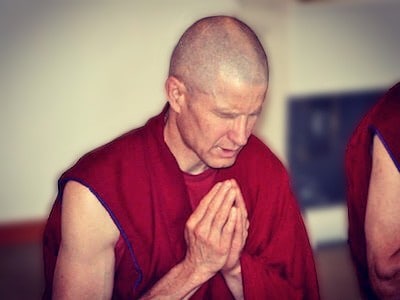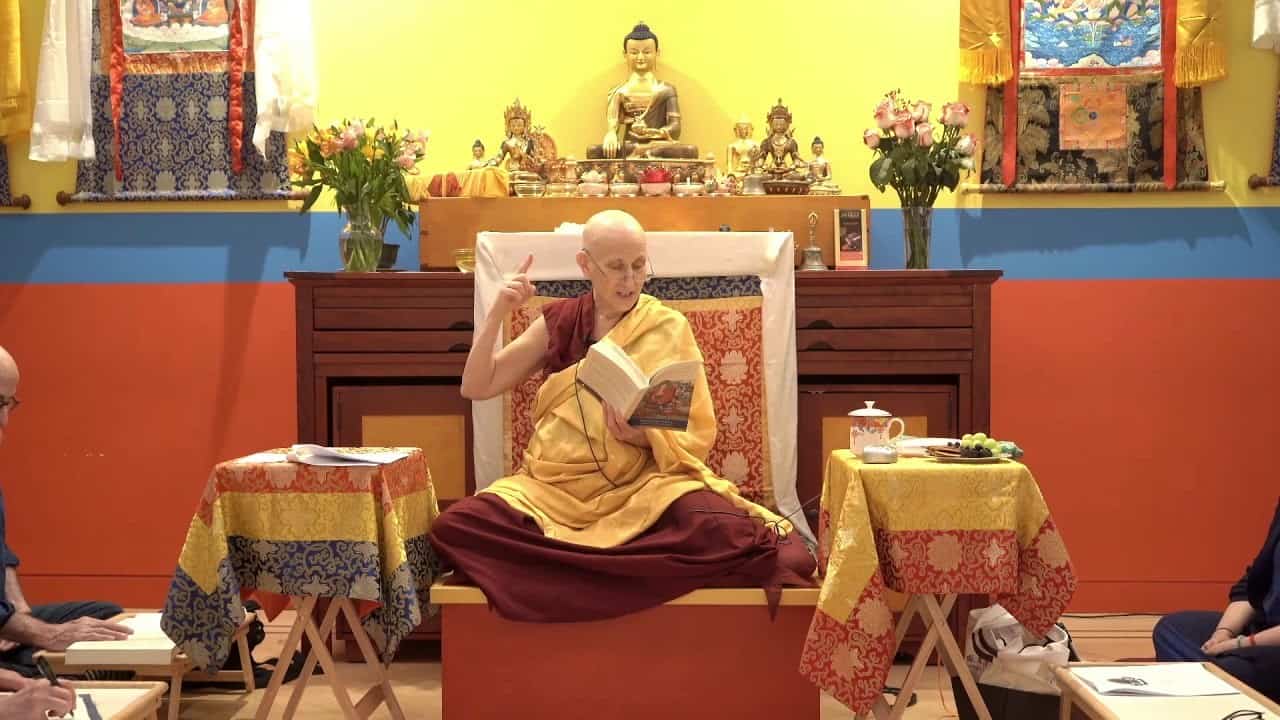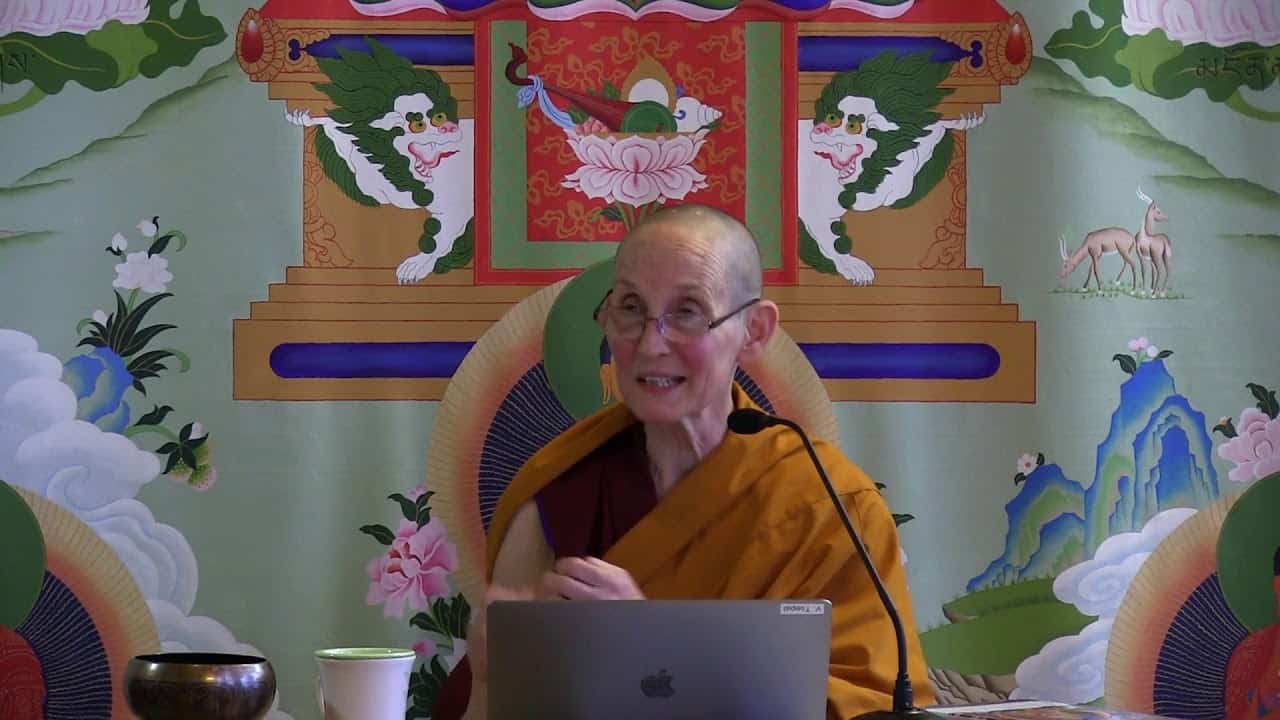Reinforcing ordination in daily life

By Jhado Rinpoche, the Abbot of Namgyal Monastery in Dharamsala.
There are many actions that Buddha has enjoined us not to do, such as eating in the evening and, for fully ordained people, cutting green things and digging the earth. For a great or a virtuous purpose, such as building a monastery, or in order to look after ourselves when we are sick, it may be necessary to engage in one of these proscribed actions. Therefore, one thing we can do when we rise is ask permission to be excused, by praying that if such and such becomes necessary during the day, it may be understood that we are not acting heedlessly, but for a very good reason.
In the morning, we Tibetans are very fond of recitation, possibly Westerners and other people are fonder of meditation. In whichever case, one of the practices is making offerings. In addition to offerings of food, water, or incense and so forth, ordained persons can offer the articles that are special to their way of life, such as robes. By offering these things many times to those Buddhas who display the aspect of being ordained, we make a stronger connection with our ordination. We can visualize and mentally offer such things to the Buddhas, or if we have any extra requisites we can offer those. We put monks’ requisites on or near the altar and offer them physically when His Holiness presides at a long-life ceremony. This is a cause for our practice of morality to become pure and perfected.
If we like meditation, we can meditate having identified ourselves as renunciates. When we begin our meditation think: “I am one of the ordained people, who sit in the inner circle when Buddha is giving his teachings. I have a special connection with Buddha through having become ordained. Buddha showed the blessing of ordination by manifesting as an ordained being while he was turning the wheel of Dharma on this earth. I am trying to follow his example.” There is a great blessing in meditating like that. Then think, “May one of the beneficial results from this practice be that I keep my ordination and that it remains stable within me.” This can bring joy to our ordination, and we can meditate with happiness that we have gone forth.
When we are about to undertake our daily tasks remember: “I am an ordained person, therefore I have to watch my behavior and be careful that it does not become contrary to the precepts that I have taken. I must guard my body, speech, and mind so that whatever unsuitable behavior other people may display, I will not react in a foolish way or get angry and so forth. I will remain like a tree, unmoving and unmoved.” Shantideva gave this advice in the Engaging in the Bodhisattvas’ Deeds.
At the end of the day, we should not just collapse into bed and go to sleep. We should review the day, cast our minds back over what happened, the occasions when we managed to follow the precepts and the occasions when made mistakes. This will enable us to really learn from what happened to us. It is through that kind of mindfulness that we will make progress. At the beginning, our practice is artificially induced by a more or less laborious effort, but when we have become directly familiar with the benefits, it becomes habitual and requires much less effort.
Just as we cannot take the precepts on our own, so it is difficult to keep them alone. Thus another condition of keeping the precepts well is not being isolated in our efforts. When we took the precepts, there was an ordination master and other Sangha present. Just so, after ordination, if we live with other members of the Sangha, we can give each other support and guidance. Being together harmoniously will be a great support for keeping our precepts properly. In Tibetan monastic assembly, the monks or nuns sit in rows facing each other. The advice is always that the people sitting in one row should respect the people in the opposite row. That is a very sensible sort of practice which will contribute to harmonious life in the monastery.
Finally, it is important to determine what constitutes pure morality. Pure morality, for gelongs and gelongmas, is not being stained by any of the downfalls, and for others who have taken rabjung, avoiding the four roots, plus, for all, avoiding the natural misdeeds. The four roots are killing humans, sexual activity, stealing things of value, and falsely claiming high spiritual attainments. Natural misdeeds are those that are wrong for everybody. Faults that are only wrong for monks and nuns are called established misdeeds. For instance, neither gelongs nor gelongmas are allowed to disturb the earth to more than a very slight depth. If it really is necessary to dig the earth, then a gelong or gelongma who takes the attitude, “Oh these rules are a bit out of date; we don’t need to think about that rule. It doesn’t matter,” is guilty of contempt towards the precept, in which case, when broken, it will be as if committing a natural misdeed and will constitute a degeneration of pure morality. But, if we think in a different way, “We really need to dig this earth in order to build this monastery,” and if we go about our work with compunction, then it need not amount to a natural fault.
Think over this advice and add to it with reflections of your own. By regularly reviewing points like these, our attitude of renunciation, and hence our determination to be free from cyclic existence, will grow stronger and stronger. Buddha said in the Sutra of the Wise and Foolish that if we compare building an enormous stupa with one person taking rabjung precepts, then the merit of the latter is far greater. The stupa is only made of stone and can be blown up or demolished. The merit from going forth cannot be destroyed like that. Its continuum lasts through to enlightenment.


